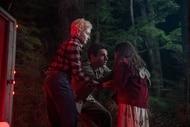Finish Him! We Name a Winner in the 1995 & 2021 Mortal Kombat Movie Cage Match
Wanna see two martial arts heavyweights square off? Then get over here!
Right or wrong, movies based on video games have walked a dark, shameful path for most of their existence. Even as gaming has seized the top market-share spot as the world’s most dominant form of entertainment, adapting their cartoonishly fantastical settings and sometimes-cryptic stories for the big screen has felt like an impossible final-boss challenge for many filmmakers — a challenge, until recently, that’s handed most of them a game-over screen with disappointed audiences.
Separated by 26 years, the pair of Mortal Kombat movies now streaming on Peacock (catch the 1995 version here, and the still-fresh 2021 reboot here) offer a unique chance at playing with perspectives when it comes to weighing what makes or breaks a successful game-based action flick. Coming only three years after the original Mortal Kombat arcade game spread like Liu Kang’s fire to early-1990s consoles everywhere, serial game-to-screen director Paul W.S. Anderson’s 1995 movie has perhaps unfairly gotten lost in the shuffle of bad-reputation films from the early days of gaming franchise crossovers… but can it compare today with the slicker, more refined presentation of debut director Simon McQuoid’s sized-up 2021 reboot?
RELATED: Mortal Kombat Has One Truly Flawless Scene
That’s the sort of question that fuels our fan passion in this strange new movie world where fantastic recent joystick flicks like The Super Mario Bros. Movie and Pokémon Detective Pikachu have all but shattered the long-entrenched crossover curse. In true Mortal Kombat spirit, we won’t shy away from a head-to-head contest and call a mere tie between the 1995 and 2021 versions. But trust us, each Mortal Kombat film has its own silly strengths — making this one martial arts movie matchup where there’s absolutely no dishonor in defeat.
Comparing the 1995 and 2021 Mortal Kombat Movies
Mortal Kombat (1995)
It’s campy and silly, the effects are questionable, and the story hardly orients the uninitiated in Mortal Kombat lore mysteries like Outworld and Earthrealm before the fists and fire start flying — yet there’s something about Anderson’s 1990s-vintage feature film that vibes just right with the brutally goofy pixel grandeur of the original Mortal Kombat (1992) and Mortal Kombat II (1993) games — the two titles that provided most of the direct inspiration for the film.
There’s plenty in Anderson’s old-school action flick that ought to be downright bad — bad dialogue, nonexistent plot development, and creature effects that just don’t do killer MK characters like Goro and Syzoth (aka Reptile) justice. But those same traits fall right in line with what fans expected from the early Mortal Kombat games. Birthed from the minds of creators Ed Boon and John Tobias (whose backwards last names spell out “Noob Saibot,” the alias of fan-favorite game series villain Sub-Zero), they were all about skipping past some half-baked story setup involving a tournament for ownership rights over Earth… and getting straight to the heart of the action.
RELATED: Fatality! That Time Tom Cruise Was Unceremoniously Turned Away from the Mortal Kombat Set
Mortal Kombat the movie has plenty of that, propelled by a cast who’s not at fault for bravely wading through the delightfully silly dialogue that the 1995 film handed them. From Bridgette Wilson as Sonya Blade to an especially cocky Trevor Goddard as villainous smart aleck Kano, and everyone else in between, the cast kept the wisecracks flowing and the character costumes on point — and thankfully, they did it in a style that faithfully shadowboxed the violent campiness of the video games themselves.
The bottom line with the 1995 flavor of Mortal Kombat is that it’s all about celebrating the characters and the action. Even if the story broke no new ground and the fatalities dialed back a smidge from the games’ gruesome gore, it managed to nail the blithely brutal spirit of what was then a burgeoning franchise.
Mortal Kombat (2021)
Flashier, more ambitious, and more playful with its lore lineage than its 1995 predecessor, McQuoid’s 2021 reboot has an actual story to tell, strapped to the back of new movie character Cole Young (Lewis Tan), who doesn’t appear in any of the Mortal Kombat video games. In the movie, Cole is descended from the venerable 17th-Century line of Hanzo Hazashi (aka Scorpion), awakening to his supernatural fighting powers — just like every other classic MK character in this film — by facing a crucial moment of stress that forcibly unleashes the fighting beast within.
Though the cast in the 1995 film was great, everyone involved in the 2021 reboot is absolutely awesome — especially Josh Lawson as Kano, who elevates one of the games series’ most colorful characters into a cursing, inebriated baddie so endearingly vile that you almost root for him to break the story cycle and actually come out victorious. Mortal Kombat 2021 spends far more front-end time, too, developing an actual plot before uncorking its genuine buckets-of-blood mayhem — which it eventually does at an R-rated level that makes the 1995 movie look positively tame by comparison.
RELATED: Mortal Kombat Is the Reason Why Paul W.S. Anderson Directed All Those Resident Evil Movies
This newer movie also deftly walks a more delicate thematic tightrope, loading up on old-school franchise Easter eggs and lore while daring to create fresh ways to make them matter. When Scorpion (Hiroyuki Sanada) erupts as Cole’s ancestral fighting partner to take down Sub-Zero (a menacing Joe Taslim) late in the film, his record-scratch delivery of the classic MK tagline “Get over here!” is up there with Thor’s “Bring me Thanos!” lightning smash in Avengers: Infinity War in terms of sheer fan-satisfying payoff.
Both the 1995 Mortal Kombat and its recent cousin ended things with intriguingly hopeful teases of what a sequel might bring, though the ending that crowns the 2021 movie wisely leaves the franchise's possibilities more open-ended than the all-out realm war that hamstrung 1997’s underwhelming Mortal Kombat Annihilation. Even though little is known about the plot of McQuoid’s upcoming Mortal Kombat 2 movie (or, for that matter, any word of a release date), at least we know they didn’t forget about Johnny Cage; though he’s nowhere to be seen in the first film’s character lineup, his Hollywood poster is one of the last things Cole sees before setting out at the end of the movie to assemble a team that Raiden (Tadanobu Asano) can be proud of.
If you haven’t guessed by now, we love both Mortal Kombat movies for different reasons — though the newer 2021 version is just better across the board, while remaining especially accessible to casual fans who’re inexperienced with the games’ wild but well-entrenched story lore. There’s really no reason not to watch ‘em both… though your surest path to a flawless victory definitely runs through Mortal Kombat 2021.
Watch Paul W.S. Anderson’s 1995 Mortal Kombat on Peacock here, and Simon McQuoid’s 2021 reboot here.












































